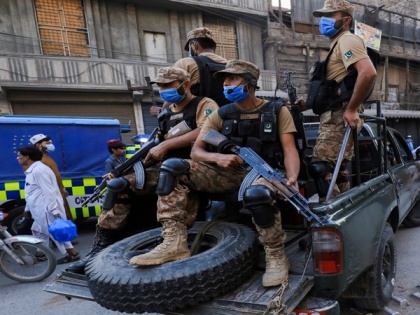2014 Peshawar attack was carried out by terrorists but facilitated by Pak military, suggests activist
By ANI | Published: October 26, 2022 12:07 PM2022-10-26T12:07:31+5:302022-10-26T17:40:07+5:30
The recent attack on school van in northwest Pakistan, along with the spike in militancy, has given rise to ...

2014 Peshawar attack was carried out by terrorists but facilitated by Pak military, suggests activist
The recent attack on school van in northwest Pakistan, along with the spike in militancy, has given rise to fear the outlawed Tehreek-i-Taliban Pakistan (TTP) is gaining ground in the country.
On December 16, 2014, six terrorists affiliated with TTP attacked the Army Public School in the northwestern city of Peshawar. 147 people, including 132 children, were killed in the attack.
The TTP created havoc in Pakistan with several attacks between 2007-2014. The TTP members had fled to Afghanistan after Islamabad launched widescale operations against the group following the Peshawar attack. But recent Pakistan media has published reports that suggest the resurgence of the outlawed group.
Fazal Khan, a human rights activist, lawyer, and founding member of the Pashtun Tahafuz Movement (PTM), in an interview with Amsterdam-based think tank EFSAS, recalled how his son was killed among more than 140 others during the 2014 Peshawar school massacre.
Born and educated in Peshawar, Khan has developed a passion for empowering marginalized individuals and communities, including during his time at university. The killing of Khan's son has driven his continued focus on human rights activism and his pursuit of justice for the children killed during the 2014 massacre.
While speaking with the European Foundation for South Asian Studies (EFSAS), Khan stated that "no words could explain" the trauma he incurred by the killing of his eldest son and described the pain of examining the bodies arriving at the hospital in the search for his child.
Khan highlighted the unusual behavior of Pakistani authorities in the build-up to the attack, during the attack, and following it, including the focus on enabling international rather than local news coverage.
Notably, the shootings took place in a school located in a cantonment in Peshawar that usually registered a high military presence, raising suspicions as to how the attack was permitted to happen. Pakistani authorities were initially unclear about the number of attackers.
"Every parent wanted to how come these terrorists were in a containment area... Peshawar is a very strategically located city and school is surrounded by office and the house of Corps commander," he told EFSAS.
According to Khan, the shootings were carried out by terrorists but facilitated by the Pakistani military establishment.
He bases this claim on assailants not targeting military personnel and established school schedules not being followed by the school, resulting in the physical concentration of children in the spaces where the shootings would take place.
In an additional indication of a potential complicity of the Army, Khan noted that the security forces that arrived at the school in response to the attack were denied access by the Army personnel present at the scene. The Judicial Commission, established only with significant delay, has failed to make gathered information publicly accessible.
Khan suggested that Pakistani security institutions facilitated the attack to ensure continued US security aid at a time when support in Washington was wavering, condemning the victims of the attacks to being 'collateral damage'.
"...In eight minutes' time, the terrorist squad arrived provincial police, elite force and the anti-terror squad arrived at the spot with the armoured vehicle. But they were not to go inside the school by the army personnel deployed outside the school. They never allowed them to go inside to rescue the children," he told EFSAS.
The TTP claimed responsibility for the massacre, yet specifically established military courts failed to prosecute relevant TTP leaders. Authorities held a TTP spokesman in a safe house before allowing him to leave Pakistan for Turkey.
For his activism, Khan faced pushback from State and non-State actors, including an assassination attempt, ultimately forcing him to leave Pakistan for the UK. In times where his life was under threat, Khan received no support from authorities and the assailants were neither caught nor prosecuted.
( With inputs from ANI )
Disclaimer: This post has been auto-published from an agency feed without any modifications to the text and has not been reviewed by an editor
Open in app